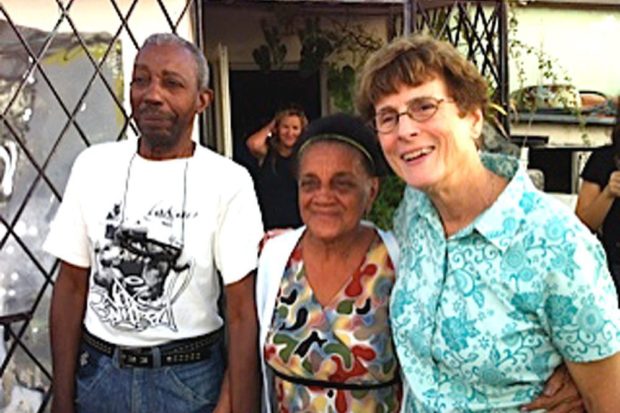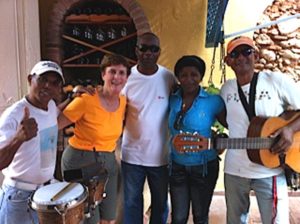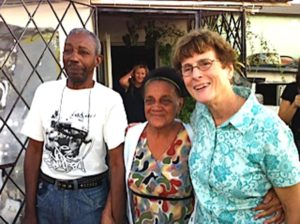
By Richard Stone
(Author’s note: In this article, I have quoted freely and with permission from a report written by one of Ellen Bush’s co-travelers who asked to be unnamed, hereafter called AJ.)

Ellen Bush has lived in Fresno for some 15 years, but her previous work as a community organizer took her to places as far-flung as Idaho and Brazil. Her work with a group reinterpreting the sayings of Jesus by direct translation from Aramaic (under the direction of Neil Douglas-Klotz) has likewise been international.
More recently, her role as an executive for the Whitney Foundation has led her into what she calls “the world of philanthropy” and to an organization called the Women Donors Foundation (WDF). This group—which helps underwrite selected projects around the world enabling women’s voices to be heard—in turn provided Bush an opportunity to travel to Cuba, under the auspices of the Center for Democracy in the Americas (CDA).
Bush says the trip came about after the heads of the WDF and the CDA were introduced at the inauguration of the newly elected president of Chile, Michelle Bachelet. Hearing about the proposed adventure, Bush says the urge to go was irresistible.
“When I was in Brazil, I was well-educated in liberation theology and the call for ‘government for the people.’ Also, I developed a love for Latin culture. Here I’ve closely followed the Pastors for Peace caravans to Cuba that pass through Fresno every June. Then too, as a member of the WDF’s Women Building Peace Committee, I was interested to get accurate information about the impact of the Cuban Revolution on women. The trip seemed a natural.”
The weeklong trip was intensive and well-designed. As AJ writes: “Leading the way was CDA Executive Director Sarah Stephens, an indefatigable and passionate advocate for normalization of relations between the U.S. and Cuba, as well as other Latin American countries…Also accompanying us was the shining Meg Crahan, a senior research scholar at Columbia University’s Institute for Latin American Studies, with over 60 trips made to Cuba since [the] 1970s.
“[During the trip we met first in Florida] with two second-generation Cuban Americans and one Peter Pan immigrant living in Miami; then in Cuba with artists and gallery owners, the mother and wife of one of the Cuban Five, an independent dance company owner, three women members of the National Assembly (Cuba’s Parliament), a representative of the Ministry of Foreign Relations, representatives of the Federation of Cuban Women (a national women’s advancement organization), a church spokesman, Marieta Castro [Raul’s daughter], an economist, a hip-hop band, and a psychiatrist who blogs about race. Wow!”
Bush says she was appreciative that the encounters were a good balance of meetings with political, social and cultural practitioners, and she especially enjoyed the visits to the art galleries, art schools and music venues. She was also pleased to have verified her understanding that the narrative of recent Cuban history provided by U.S. politicians and media is outdated and full of false impressions. She found the people warm and welcoming, even to Americans, and that, while Cubans may call themselves socialists, there is no longer any attraction to Russian-style communism.
She observed that the people also express a realistic understanding that Cuba is not paradise. As AJ puts it, “No es facile (life isn’t easy) is almost a mantra. It’s the classic refrain when a car breaks down, an elevator stops working, a government official tells you you’ll have to wait another week for that meeting or when your government-issued rice is insufficient. And these things happen a lot.”
Americans are largely unaware that Cuba is now experimenting with new economic policies giving individuals greater entrepreneurial freedom. AJ again: “Realizing people needed to supplement their meager incomes, the government loosened laws around private business ownership over time, and so were born creative small businesses. And I mean small.
“Walking in the streets of towns we saw not only cobblers and women selling their handmade crafts, but also the smallest business I think I’ve ever seen, a Lighter Refurbisher. That’s right, your non-refillable Bic lighter runs out of fuel, so you take it to the street guy and he tears it apart, refills it with fuel, makes sure the flint works, reassembles it and it’s ready to go. Very little in Cuba is thrown away. Everything is a candidate for reuse and recycling.”
These economic experiments are in no way perfected. AJ again: “One of the most surprising things we learned in Cuba is how the socioeconomic scale is inverted from ours. Doctors, lawyers and government officials make less than tour guides, artists and musicians.
“When Cuba introduced the dual currency system 10 years ago, it had an unanticipated consequence. Everyone who works for the government—and remember the government runs the hotels, schools, medical facilities, farms, almost everything—is paid the same and in national pesos (24 to a dollar), whereas those who interact directly with foreigners are paid more, and are paid in CUCs (tourist pesos worth about $1).

“Cab drivers, for example, charge tourists in CUCs and get CUC tips on top of that. [Not only do they make more], they can purchase luxury items like cell phones, upscale clothing and new cars which are for sale only in the CUC currency.
“While doctors and lawyers are trained for free, they’re paid a low wage by the state. Meanwhile, artists selling to tourists or art galleries abroad can do better. Being an artist is a pathway out of poverty in Cuba!” But it’s not a prescription for keeping your trained professionals at home.
Bush notes that while women have gained tremendously from the revolution, the machismo and color-discrimination she knew well from living in Brazil are still present in Cuba. And the new opportunities for self-enterprise often leave women with a double work burden. She observed that the hardship of life is handled in a wide variety of ways, from a desire to emigrate and find an easier existence elsewhere to stubborn determination to prove that the new Cuba can succeed without adhering to the U.S. economic model.
Cubans are well aware—and resentful—of the U.S. policies (rejected by the rest of the international community but still very impactful) to isolate and subvert the Cuban revolutionary experiment. AJ: “Throughout our trip, we heard this refrain: Remove Cuba from the U.S. Terrorist List. End the embargo. Release the Cuban Five (a group sent to Florida to gather intelligence about planned attacks against Cuba, but then perversely convicted of spying with the intent to harm the United States).
“The U.S. currently includes Cuba on its list of State Sponsors of Terrorism…Obama could sign an Executive Order to remove Cuba at any time. Next, Congress should vote to end the embargo, which is illegal. And finally, the U.S. should release the Cuban Five.” Bush adds that she was moved by the group’s meeting with relatives of the Cuban Five who are dedicating their own lives to reversing this overt injustice. And, in general, she was greatly taken by the Cuban people, their culture and their aspirations.
AJ ends by saying, “In short, Cuba was beautiful, complex, mysterious and always engaging. Be sure to get there, especially before the Castro brothers depart planet Earth. Before I left, on postcards featuring Che Guevara laughing, I wrote my friends in the States, ‘Truly, I wish you were here!’”
(Editor’s note: The CDA has issued a forthright, nuanced report on “Gender Equality and the Role of Women in Building Cuba’s Future.” This publication communicates well Cuba’s successes and problems alike in transforming its society and economy. A copy is available for reading at the Fresno Center for Nonviolence (1584 N. Van Ness Ave.), or from Ellen Bush, who can be reached at milandra@comcast.net.)
*****
Richard Stone is on the boards of the Fresno Center for Nonviolence and the Community Alliance. Contact him at richard2662559@yahoo.com.
